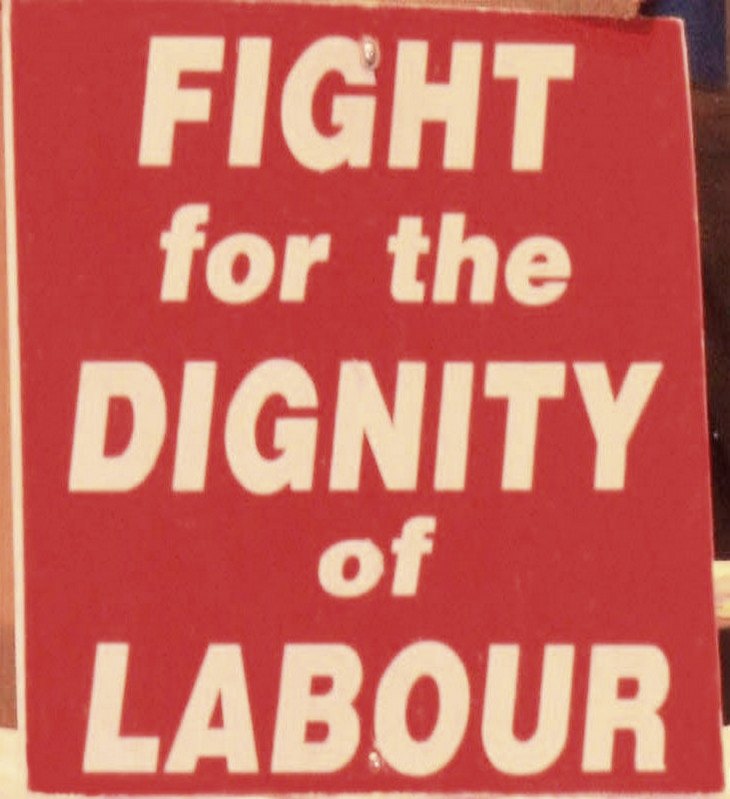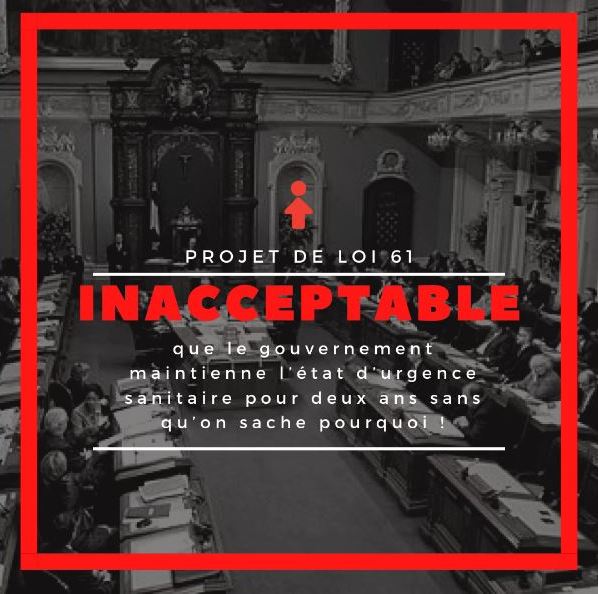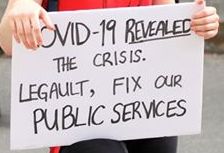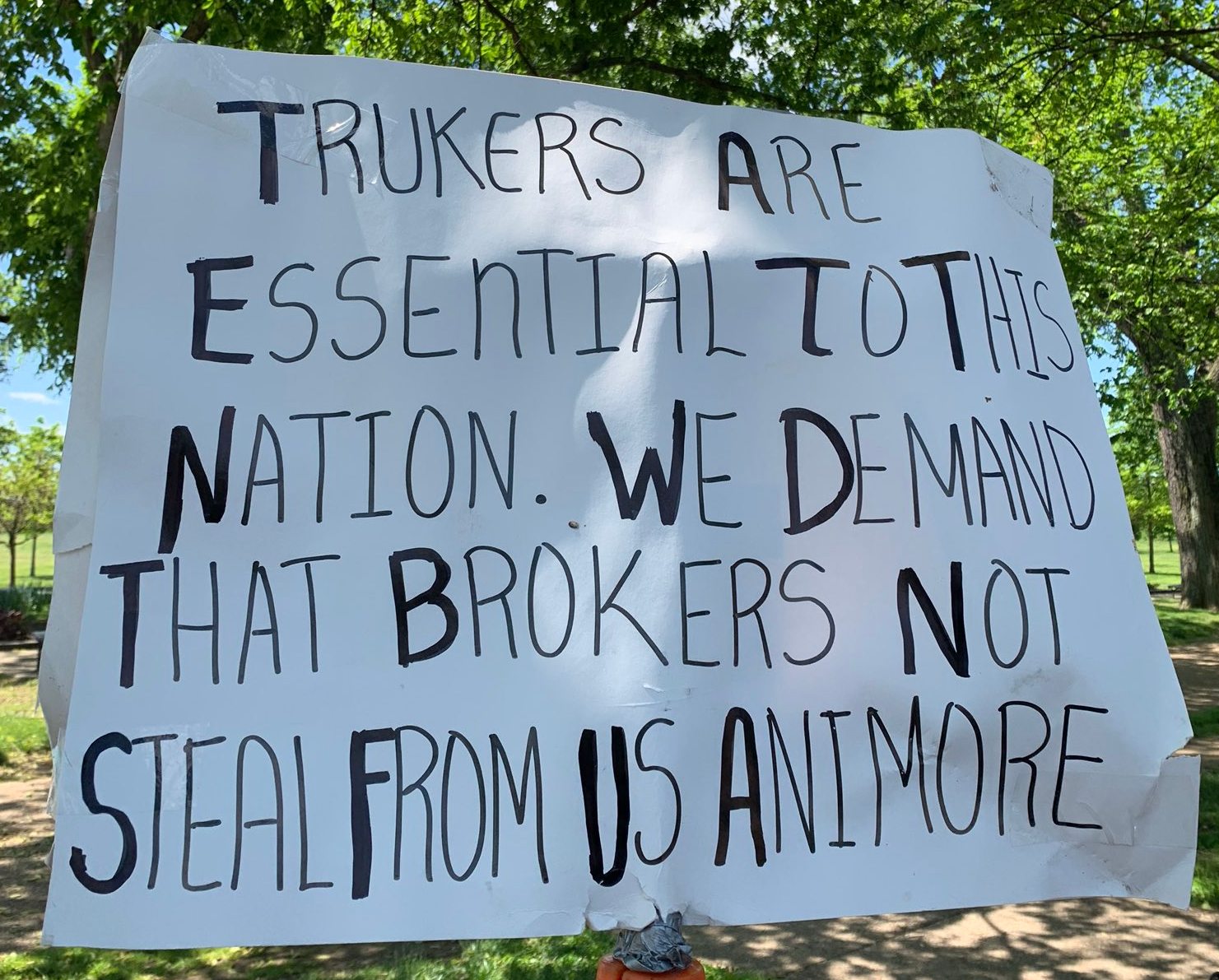|
July 7, 2020 - No. 47
Opposition to Governments' Increased
Use of Arbitrary Powers
  
Quebec Government's Bill 61
• Workers' Opposition to Use of Pandemic and Restart of Economy to Strengthen Arbitrary Powers of the State - Pierre Chénier
• Regressive Features of Bill 61
Increase in Construction Accidents Involving Cranes
• Reinstate Compulsory Vocational Training for Crane Operators Now!
Historic Truckers' Occupation in Washington
• What Next for Truckers and the Trucking Industry?
- Normand Chouinard
Quebec Government's Bill 61
- Pierre Chénier -

Health care workers protest outside Premier Legault's office in Quebec
City, May 19, 2020, demanding an end to government's use of arbitrary
powers to violate their rights during the COVID-19 pandemic.
The Legault government on June 3 tabled Quebec Bill 61 -- An
Act to restart Quebec's economy and to mitigate the consequences of the
public health emergency declared on 13 March 2020 because of the
COVID-19 pandemic.[1] The
bill's stated aim is to mitigate the consequences of
the public health emergency by fast-tracking for two years the
construction of 202 public infrastructure projects such as schools,
seniors' residences, road work and public transit. The bill gives the
government the option to decree the building of additional public or
private projects. Quebec Premier François Legault said the
powers of the bill,
which have been widely denounced as arbitrary, are critical to
re-launching the Quebec economy after weeks of pandemic-induced
shutdowns.
 As
a whole, the bill is an attempt to use the pandemic and reopening of
the economy as a pretext to strengthen the arbitrary powers of the
state and further deprive working people of any say whatsoever on
matters of concern. It also further denies the National Assembly and
its members any legislative power, as all decision-making power is
concentrated in the hands of the ministers in the service of narrow
private interests. Bill 61 grants the government the power to extend
the public health emergency outside the Public Health Act and any oversight by the public and even members of the National Assembly. As
a whole, the bill is an attempt to use the pandemic and reopening of
the economy as a pretext to strengthen the arbitrary powers of the
state and further deprive working people of any say whatsoever on
matters of concern. It also further denies the National Assembly and
its members any legislative power, as all decision-making power is
concentrated in the hands of the ministers in the service of narrow
private interests. Bill 61 grants the government the power to extend
the public health emergency outside the Public Health Act and any oversight by the public and even members of the National Assembly.
The declaration of a public health emergency on March 13
gave arbitrary power to the government executive to cancel all
negotiated agreements with health care and social service workers. The
executive has used the power to unilaterally change public sector
working conditions. The indefinite extension of this arbitrary power is
a big attack on
workers and their rights and must not pass!
In addition to the attack on public sector workers, Bill
61 grants all power to the government executive to cancel and violate
existing laws and regulations under the hoax of speeding up the
reopening of the economy. Bill 61 allows the government executive to
violate legal provisions in the Public Health Act, the Environment
Quality Act, the Expropriation Act, and the Act Respecting Contracting by Public Bodies and in addition gives immunity from prosecution to government ministers and others using the bill's provisions.
Bill 61 in effect grants the executive the power to
eliminate at will environmental regulations, regulations regarding
expropriation of the property of individuals for economic projects, and
regulations regarding the awarding of public contracts to private
companies to build public infrastructure projects along with immunity
from prosecution for
wrongdoings. This grab for greater executive power must not be allowed!
A crisis such as the pandemic must not be used to attack
the people, violate their rights and shut them out even more violently
from the decision-making power. Working people must assess what is
going on and step up their fight for empowerment so that the problems
caused by the pandemic can be resolved in their favour, not that of the
rich. The pandemic shows that a new direction of the economy is
necessary, a direction decided by working people and under their
control.
The people demand this regressive bill be withdrawn
immediately. Those who have tabled this anti-worker and anti-social
bill and are pushing for its passage to give the government executive
even greater arbitrary powers must be declared unfit to rule and
removed from public office.
Manoeuvring to Push Through Bill 61
Bill 61 was introduced a mere nine days before the
official day of adjournment of the Quebec National Assembly on June 12.
Premier François Legault, then President of the Treasury Board
Christian Dubé and other spokespersons of the Cabinet arrogantly
demanded that the bill be hurriedly passed before adjournment.
 Even though the Legault government holds a majority of seats in the
National Assembly, the bill required the unanimous consent of all three
opposition parties and the independent members of the National Assembly
for the principle of the bill to be adopted and allowed immediately to
go into committee and subsequent readings. A procedural
rule in the National Assembly requires unanimous consent when a bill is
introduced after mid-May before the summer adjournment.
Even though the Legault government holds a majority of seats in the
National Assembly, the bill required the unanimous consent of all three
opposition parties and the independent members of the National Assembly
for the principle of the bill to be adopted and allowed immediately to
go into committee and subsequent readings. A procedural
rule in the National Assembly requires unanimous consent when a bill is
introduced after mid-May before the summer adjournment.
In an effort to gain the unanimous consent of the
members of the National Assembly, the Legault government tabled 18
amendments the day before the summer adjournment. Legault's effort to
"soften" the bill failed to win the unanimous consent needed to rush
the bill through in principle. The opposition of the people to Bill 61
outside the
National Assembly was so intense many commentators said it would have
been suicidal for the other parties and members to agree to this
manoeuvre of the Legault government. It is likely that when the
National Assembly reconvenes in September the Legault government will
use its majority of seats to adopt the bill despite the
people's mounting opposition to it.
Note
1. On June 21, Quebec Premier François Legault
reshuffled his Cabinet, once again using the pandemic as a pretext for
stepping up the anti-social offensive against the people. To find out
more about this read Legault Government's Shameless Grandstanding -- TML Weekly, July 4, 2020.

Through Bill 61 -- An Act to restart Quebec's
economy and to mitigate the consequences of the public health emergency
declared on 13 March 2020 because of the COVID-19 pandemic, the
Legault government seeks executive power for another two years to
violate and override existing law in order to fast-track the
construction of
202, and possibly more, public infrastructure projects such as schools,
seniors' residences, road work and public transit. The bill contains
regressive features that many have denounced as arbitrary such as the
continuing power to deprive public sector workers of their right to
working conditions acceptable to themselves within negotiated
collective
agreements.
Violates Environment Quality Act
Article 15 of the bill states that the government may through executive dictate declare that provisions of the Environment Quality Act will
not apply to certain projects. Bill 61 gives the government executive
the power to single out projects to be sped up and prescribed with
provisions replacing those in the existing Environment
Quality Act.
With this power, government executive regulations become law according
to whatever the authority wants. This means the government can
arbitrarily according to its whim, and possibly to accommodate powerful
private interests, override and violate legal provisions in the Environment Quality Act.
Violates Expropriation Act
In cases of expropriation of the property of individuals
to make way for economic projects, executive authority under Bill 61
can declare illegal any legal challenge of the expropriating party's
right to expropriate under the Expropriation Act. The government says this arbitrary power to deny rights in violation of existing law is
needed under the pragmatic hoax of speeding up economic projects.
Violates Act Respecting Contracting by Public Bodies
Regarding the awarding of public contracts, the bill
says that the government may by regulation or on the recommendation of
the Treasury Board determine as acceptable certain actions that are in
fact in contradiction with the Act Respecting Contracting by Public Bodies.
This could mean the elimination of public calls for tenders thus
facilitating the awarding of contracts to specific monopolies according
to executive fiat. This arbitrary executive power is not new per se as
it already exists and has been used. What is new is that the bill would
now enshrine this arbitrary executive power in law declaring it above
any existing regulations.
This provision in the bill has already caused an uproar
as it revives and brings to the fore the memory in Quebec of open ugly
corruption in the awarding of public contracts to private interests in
return for financing of certain political parties. The uproar has
forced the government at this point to declare that the power to
restrict public calls
for tenders will apply only to those projects involving municipal
bodies.
Extends Public Health Emergency Indefinitely
Among other things, the declaration of a public health
emergency on March 13 gave power to the government executive to cancel
negotiated collective agreements with health care and social service
workers in order to unilaterally change their working conditions. This
attack on workers' rights has been loudly condemned.
Bill 61 introduces a clause to extend indefinitely the
public health emergency and its anti-worker powers. In effect, the
indefinite extension of the emergency measures contradicts the Public Health Act
under which the public health emergency was declared. The legal measure
in the Act says that a public health emergency is effective
for a maximum period of 10 days. The government must then renew the
emergency and renew it again every 10 days for as long as it deems
necessary or for 30 days with the consent of the National Assembly. A
government proposed amendment to Bill 61 says the emergency and its
arbitrary attacks on public sector workers will continue until
October 2020 and longer if necessary.
Provides Government with Immunity from Prosecution
As was the case with the declaration of a public health
emergency and the powers that it gives, the bill is framed to provide
total immunity for the government executive. The preamble of the bill
explicitly says, "Immunity from prosecution is granted to the
Government, a minister, a public body or any other person who performs
an act in good
faith in exercising powers introduced by this bill or implementing
measures taken under those powers."
This creates a very dangerous situation for the people
and Quebec society. The pandemic and declaration of a health emergency
and now the reopening of the economy are being used to further
concentrate political power in fewer hands, which are subordinate to
narrow private interests. For example, with this bill the government
may decide
that safety training and standards in construction are regulations
hindering the mitigation of the consequences of the pandemic and the
reopening of the economy. This argument has already been used in the
construction and other sectors, eroding health and safety standards and
putting workers and the broad public at great risk. Enshrining these
regressive practices in law and providing those enforcing them with
immunity are cause for serious concern.

Increase in Construction Accidents Involving Cranes

Demonstration by crane operators in Montreal, May 5, 2018, demanding
mandatory Diploma of Vocational Studies training requirements for Crane
operators by reinstated.
Quebec crane operators report that accidents involving
the operation of cranes are on the rise in Quebec. Since September 2019
there have been 10 reported accidents, and, according to the Crane
Operators' Union, seven of them involved operators who have not
completed the 870-hour Diploma of Vocational Studies (DEP) or
equivalent
training through credential recognition (recognition of prior learning
and competencies that reduce the number of hours of vocational training
required). The most recent accident occurred in June in l'Assomption,
where a heavy equipment operator, without crane operator training,
dropped a load on three workers while operating a boom truck on
the Highway 341 bridge construction site. The three workers were
injured, one of them seriously.
Many of these accidents involve boom
trucks with a maximum capacity of 30 tonnes, which are small cranes
used for transporting materials and equipment, and are the cranes that
overturn the most easily. Yet it is for the operation of these cranes
that
the
government and the Quebec Construction Commission introduced a course
of only 80 hours, replacing the 870 hours of vocational training. We
are seeing the results today.
 The
government and the CCQ put forward the most unprincipled, pragmatic
arguments, suggesting that it is not necessary to be a qualified crane
operator to operate boom trucks, and that the union is just trying to
maintain its monopoly and control over the trade for selfish reasons by
requiring mandatory and appropriate vocational training for
crane operators. It is the government and the CCQ that are driven by
the goal of serving narrow private profit at the expense
of the safety of workers and the public. The crane operators are
defending the safety of all. The
government and the CCQ put forward the most unprincipled, pragmatic
arguments, suggesting that it is not necessary to be a qualified crane
operator to operate boom trucks, and that the union is just trying to
maintain its monopoly and control over the trade for selfish reasons by
requiring mandatory and appropriate vocational training for
crane operators. It is the government and the CCQ that are driven by
the goal of serving narrow private profit at the expense
of the safety of workers and the public. The crane operators are
defending the safety of all.
The mandatory Diploma of Vocational
Studies was introduced in 1997 precisely to reduce deaths and accidents
involving crane operation. Fatalities have been reduced by 66 per cent
since its introduction. The situation now seems to be returning to what existed before
the DEP in terms of dangers and the construction workers are stepping
up their fight against these regressive measures and this refusal by
the authorities to take up their social responsibility.
In an interview with Workers' Forum, the
director of the Crane Operators' Union, Evans Dupuis, said that if the
situation continues, deaths will occur because of the lowering of crane
operator training. This is in the construction sector, which already
has the highest number of deaths yearly of all sectors of the Quebec economy.
"The Minister of Labour must intervene to review the
regulations governing the crane operator trade and boom truck
activity," he said. "We see what happens when the boom truck is driven
by people who do not have the skills to do so. We're told that it's not
really dangerous to operate a boom truck, that it's just a small crane,
but at
l'Assomption we came very close to killing someone with a 30-ton boom
truck. In addition, we are seeing more and more major accidents with
cranes overturned and people injured. We've had 10 accidents in nine months.
Usually, we have three or four accidents a year. All this is directly related
to the lowering of the training of crane operators."
Evans also spoke about Bill 61, the bill on restarting the economy that the government tabled at the beginning
of June, and its impact on the health and safety of workers and the
public.
"Bill 61 would give the government the power to change
anything and provide itself with immunity in the name of economic
recovery. The government wants to give itself full powers to change
anything it wants without consulting and without following its own laws
and regulations. In the name of filling labour shortages, it wants to
allow
people to work without training, which will put everyone at risk. They
want to make decisions on their own without listening to anyone. This
will have a major impact on the health and safety of workers."
Workers' Forum joins all workers in demanding that the government immediately reinstate mandatory vocational training for crane operators.

Historic Truckers' Occupation in Washington
- Normand Chouinard -
 Three
months have passed since the start of the pandemic and a lot of water
has flowed under the bridge for road transport workers in the United
States and Canada. By putting forth immediate demands from the
start of the pandemic for safe and
healthy working conditions for the performance of their work they have shown that they
want to have a say in their lives and their trades. The demands of
truckers to guarantee an effective health protocol for road transport
during the pandemic were energized by a great feeling of solidarity and
unity from the truckers' movement for the assertion of their rights and
for the recognition of their profession. This active resistance from
road
transport workers even forced some members of the ruling elite to
react. These elite members began to proclaim that we are an essential
service and that the work of truckers is important in securing the
supply chain. Road transport workers felt proud and dignified that
their role in the economy was finally recognized for its true worth.
This gave
confidence that things could change in their favour. Three
months have passed since the start of the pandemic and a lot of water
has flowed under the bridge for road transport workers in the United
States and Canada. By putting forth immediate demands from the
start of the pandemic for safe and
healthy working conditions for the performance of their work they have shown that they
want to have a say in their lives and their trades. The demands of
truckers to guarantee an effective health protocol for road transport
during the pandemic were energized by a great feeling of solidarity and
unity from the truckers' movement for the assertion of their rights and
for the recognition of their profession. This active resistance from
road
transport workers even forced some members of the ruling elite to
react. These elite members began to proclaim that we are an essential
service and that the work of truckers is important in securing the
supply chain. Road transport workers felt proud and dignified that
their role in the economy was finally recognized for its true worth.
This gave
confidence that things could change in their favour.
When transportation prices began to plummet during the
depths of the confinement, a large organized resistance movement
emerged in the United States to prevent the burden of the crisis from
being shifted onto the backs of independent truckers and, indirectly,
onto all of the drivers. In several American states, rallies have been
held to demand
new arrangements, including regulations to legislate the percentage
received by large transport brokers on the price offered for a trip by
heavy truck. This movement was crystallized in the course of a 21-day occupation in front of the White House by
more
than 350 truckers from all over the United States of different
national origins. Other similar occupations were held near other state
capitols. During this 21-day period, the truckers in attendance learned
to organize themselves so that everyone had food and felt safe. BBQs
were organized on the sidewalks, and sanitary equipment was
rented. There were arrivals and departures of trucks from all
over the
United States. Some stayed one day, two days, one week, others stayed
there for the 21 consecutive days of the occupation. In short, there
was an
atmosphere of camaraderie that has not been seen for a long time among
road transport workers.

Truckers' 21-day occupation outside the White House, May 2020.
The truckers' main request was to meet with members of
the central government to discuss the issue of income imbalance in the
trucking industry. The drivers present were very active in making themselves heard,
walking around the U.S. capital, honking their horns,
talking with people, etc. They even disrupted a daily press conference
by
President Trump on the COVID-19 situation by honking their horns to
attract the attention of the politicians and journalists present.
Trump, as usual, used this opportunity to assert himself by saying that
the horns were in support of him and that truckers across the United
States were on his side. He totally evaded the truckers' fight for
their
rights. A few days later, the Trump administration, with great fanfare, organized a press
conference in which there was a 53-foot FedEx
truck and where Trump thanked the truckers for the work they did during
this period. Again, nothing concrete about the demands of the truckers
gathered a few hundred feet from the White House.
 Then
came the day when two "representatives" of truckers, one of whom openly
portrayed himself as a "Trumpster," were allowed to meet with members
of the Trump administration. The meeting ended with the promise of a
review of the regulations on driving hours but absolutely nothing on
the issue of regulating the percentage going to transport
brokers. On that, they were told that the government cannot legislate
on this because the United States is a free market country and it is
free market laws that set prices. The two "representatives" left the
meeting claiming that a battle had been won and exalting
President Trump, saying that they "thanked God" that finally the
truckers had a
president on their side. A "deal" behind the closed doors of the White
House had just been sealed. It was with a feeling of bitterness and
dissatisfaction, a feeling that something had escaped them, that the
truckers' occupation ended and that they gradually returned to
their homes. Then
came the day when two "representatives" of truckers, one of whom openly
portrayed himself as a "Trumpster," were allowed to meet with members
of the Trump administration. The meeting ended with the promise of a
review of the regulations on driving hours but absolutely nothing on
the issue of regulating the percentage going to transport
brokers. On that, they were told that the government cannot legislate
on this because the United States is a free market country and it is
free market laws that set prices. The two "representatives" left the
meeting claiming that a battle had been won and exalting
President Trump, saying that they "thanked God" that finally the
truckers had a
president on their side. A "deal" behind the closed doors of the White
House had just been sealed. It was with a feeling of bitterness and
dissatisfaction, a feeling that something had escaped them, that the
truckers' occupation ended and that they gradually returned to
their homes.
The weeks following this historic mobilization for
American road transport workers saw no rate hike nor any
change in the percentage received by brokers. Hundreds of thousands of
independent truckers are still squeezed by low prices that put their
financial situation in jeopardy.
This situation, although difficult and complicated, did
not prevent the truckers from continuing the fight. As the problem has
not been resolved, they still demand a solution. The discussion
continues through social media and other media they themselves created,
particularly truckers of Punjabi, Latin American and other origins.
We know what followed. The organized resistance movement
against state racism in the United States has asserted itself and has
become a central political issue, not just for the American people but
for people around the world. In the first days after George Floyd's
death, the monopoly media misrepresented incidents in which truckers
were
caught in the midst of protests, claiming that truckers were being
attacked by "rioters."
Recently, proposals have circulated on social media from
unknown sources in the U.S. on the right of truckers to carry a weapon
to protect themselves from possible assaults, posts which even ended up on
trucker sites in Canada.
The road transport workers movement in the United States
will not allow itself to be divided by such clumsy provocations.
Truckers face racial and economic discrimination in the trucking
industry in which they compete against each other. In particular,
immigrant truckers of all origins pay the price of being cheap labour
for large transportation
companies and large manufacturing and distribution monopolies, and are
subjected daily to state-organized racism. They are an integral part
of the battle to end this state of apartheid among the working class
which aims to divide them and constantly lower their working conditions.
But in the current context of diversion, infamy and lies
and the set-up of the imperialist ruling circles against the movement,
the most complex task is to stay the course on the initial demands for
the defence of the fundamental interests of truckers. Permanent
arrangements that will guarantee the stability of the trucking industry
and fully respect
the rights of truckers are still on the agenda. They must continue on
the independent path they have taken and never become an electoral
political reserve for one clique or another of the ruling elites who
are tearing themselves apart to monopolize supreme power and want to drag truckers
into their quarrels.
The spirit of unity, solidarity and organizational
skills, hard-won over the past few weeks, is the new benchmark for the
establishment of political arrangements that work for those in the
trucking industry. This spirit must be firmly defended in the present
situation.

(To access articles individually click on the black headline.)
PDF
PREVIOUS
ISSUES | HOME
Website: www.cpcml.ca
Email: office@cpcml.ca
|

